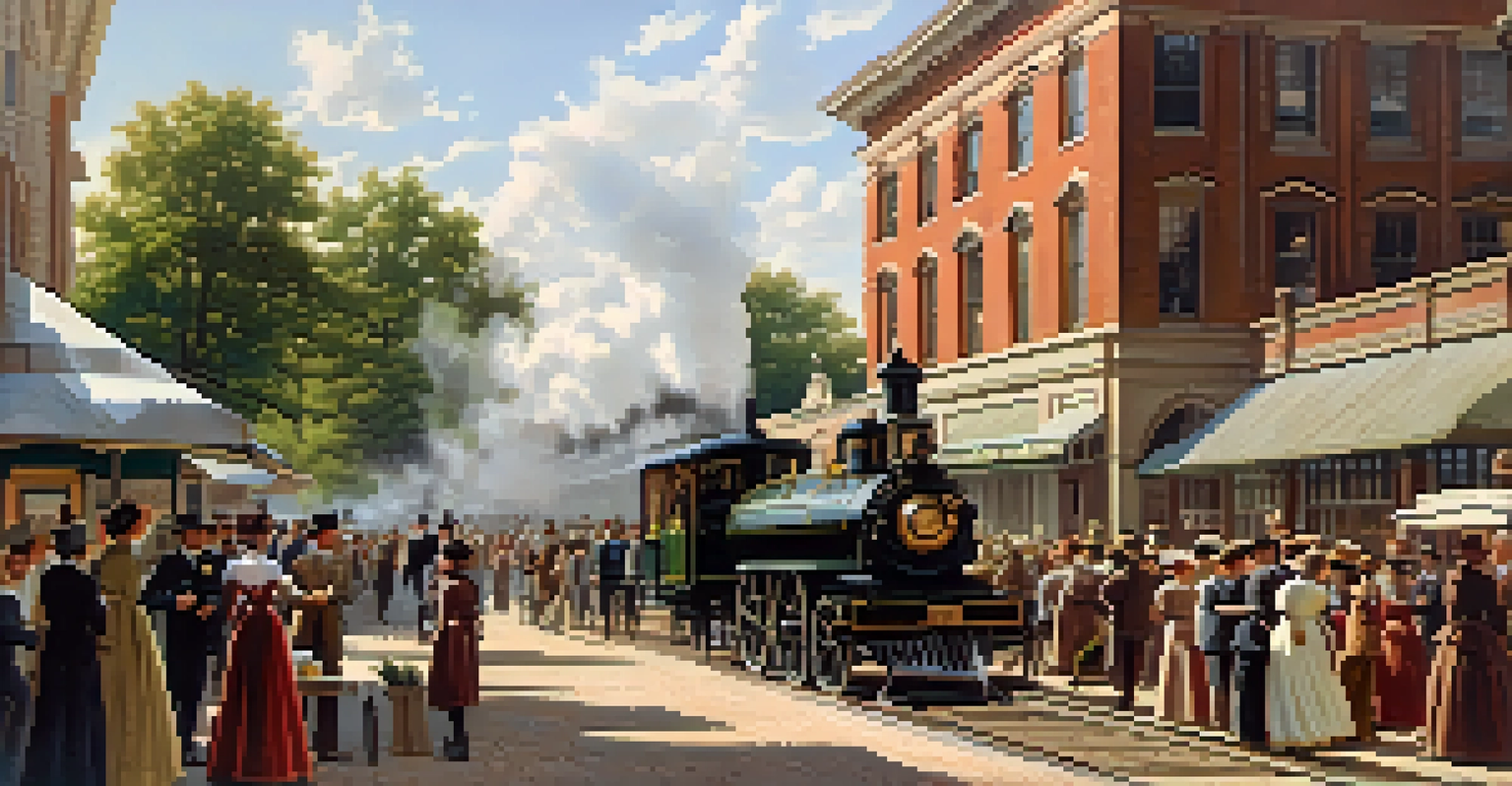Founding of Raleigh: The Birth of North Carolina's Capital City

The Vision Behind Raleigh's Establishment
In the late 18th century, North Carolina was experiencing rapid growth and needed a centralized location for governance. The leaders of the time envisioned a city that could serve as the capital, reflecting both the aspirations and the unique character of the state. This vision led to the establishment of Raleigh, which was to be a symbol of progress and unity.
The future belongs to those who believe in the beauty of their dreams.
The choice of location was strategic; situated at the crossroads of major trade routes, Raleigh was seen as an ideal spot to connect the eastern and western parts of the state. The idea was to create a new city that would stand as a beacon of hope and development for North Carolina. In contrast to other cities, Raleigh was planned from scratch, allowing for a layout that catered to future growth.
Thus, in 1788, Raleigh was officially selected as the state capital, marking the beginning of its journey. The decision reflected a commitment to building a vibrant community that would serve not only the present but also future generations. This foresight laid the groundwork for what would become a bustling urban center.
The Name and Symbolism of Raleigh
Raleigh was named after Sir Walter Raleigh, an English explorer and writer, who was instrumental in the early attempts to colonize North America. This choice was more than just a name; it symbolized ambition and the spirit of adventure that characterized the age of exploration. By naming the city after such a prominent figure, North Carolina was positioning itself as a place of opportunity and promise.

The selection of Raleigh as a name also served to honor the state’s historical roots. Sir Walter Raleigh was associated with the Roanoke Colony, one of the first English attempts at establishing a settlement in America. This connection to the past highlighted the city's role as a continuation of the efforts to forge a new life in the New World.
Raleigh's Strategic Founding
Raleigh was established in the late 18th century as North Carolina's capital, strategically located to connect trade routes and promote growth.
In a way, naming the capital Raleigh was a nod to the hopes of the settlers who had come before. It served as a reminder of their struggles and triumphs, as well as the potential for growth and discovery that lay ahead. This rich historical context would shape the identity of the city for years to come.
The Role of Design in Raleigh's Founding
A significant aspect of Raleigh's founding was its unique design, which was orchestrated by the architect William Christmas. The city was laid out in a grid pattern, with wide streets and ample public spaces, reflecting Enlightenment ideals of order and reason. This thoughtful design was intended not only for practicality but also to create a sense of community and collaboration among its inhabitants.
History is not a burden on the memory but an illumination of the soul.
Central to Raleigh's design was the Capitol building, which served as the heart of the city. Surrounded by parks and gathering spaces, the Capitol was a focal point for civic life and governance. This centralization of authority helped to reinforce the idea of Raleigh as the political and social hub of North Carolina.
Moreover, the city was envisioned as a place that would evolve over time, accommodating the needs of its residents as they grew. The foresight in planning allowed Raleigh to adapt and expand, ensuring it remained relevant as the state developed. This approach to urban planning has influenced many cities, serving as a model for future developments.
Challenges in the Early Years of Raleigh
Despite its promising beginnings, Raleigh faced numerous challenges in its early years. The city was established during a time of political turmoil and economic uncertainty, which made attracting settlers and businesses difficult. Many residents were hesitant to move to a new city that had yet to prove its viability as a center of commerce and governance.
Additionally, the infrastructure was rudimentary, with limited resources available for public services and amenities. Roads were poorly maintained, and basic necessities were often hard to come by, leading to frustrations among the early citizens. This lack of development created a perception that Raleigh was less desirable compared to more established towns.
Cultural Hub of Innovation
Today, Raleigh is recognized as a vibrant center for technology and culture, blending its historical roots with modern advancements.
However, perseverance and determination were hallmarks of the early Raleigh community. Slowly but surely, improvements were made, and the population began to grow. As more people settled in the area, businesses started to flourish, paving the way for Raleigh to become the vibrant city it is today.
Raleigh's Growth in the 19th Century
As the 19th century unfolded, Raleigh began to establish itself as a significant urban center. The introduction of the railroad in the mid-1800s played a crucial role in connecting the city to other parts of North Carolina and beyond. This transportation revolution facilitated trade and commerce, allowing Raleigh to flourish economically.
With the growth of industries and businesses, the population swelled, leading to the development of residential neighborhoods and public infrastructure. New schools, churches, and cultural institutions emerged, contributing to a sense of community and identity among the residents. Raleigh was no longer just a political capital; it was becoming a vibrant, thriving city.
By the end of the century, Raleigh had transformed into a hub of culture and governance, reflecting the state’s rapid advancements. The blend of innovation and tradition shaped the character of the city, paving the way for its future growth and development. This period set the stage for Raleigh to play a pivotal role in North Carolina's history.
Raleigh's Role in the Civil Rights Movement
As the nation grappled with issues of civil rights in the mid-20th century, Raleigh emerged as a crucial site for activism and change. The city was home to several key events and figures that played an integral part in the fight for equality. This period marked a significant chapter in Raleigh's history, reflecting broader national struggles.
Local universities, particularly North Carolina State University, became hotbeds for civil rights discussions and protests. Students rallied for desegregation and equal rights, sparking movements that resonated throughout the South. The activism in Raleigh was part of a larger wave of change that aimed to dismantle systemic racism and promote social justice.
Legacy of Civil Rights Activism
Raleigh played a pivotal role in the civil rights movement, with local universities becoming key sites for activism and social change.
The legacy of Raleigh's involvement in the civil rights movement continues to be felt today. The city has evolved into a more inclusive community, celebrating its diverse heritage. The courage and determination of those who fought for equality have left an indelible mark on Raleigh's identity and values.
Raleigh Today: A Capital of Innovation and Culture
Fast forward to the present day, and Raleigh stands as a dynamic capital known for its innovation and cultural vibrancy. The city has transformed into a hub for technology and research, attracting businesses and talent from all over the country. This evolution reflects the original vision of Raleigh as a place of growth and opportunity.
Moreover, Raleigh boasts a rich cultural scene, with numerous museums, theaters, and music festivals that celebrate its diverse heritage. The city is home to a thriving arts community, which contributes to a lively atmosphere and fosters creativity among its residents. This cultural richness has made Raleigh a desirable place to live and work.

In essence, Raleigh has successfully blended its historical roots with modern advancements, creating a unique identity that honors its past while looking towards the future. As North Carolina's capital, Raleigh continues to thrive, embodying the spirit of progress and community that characterized its founding.